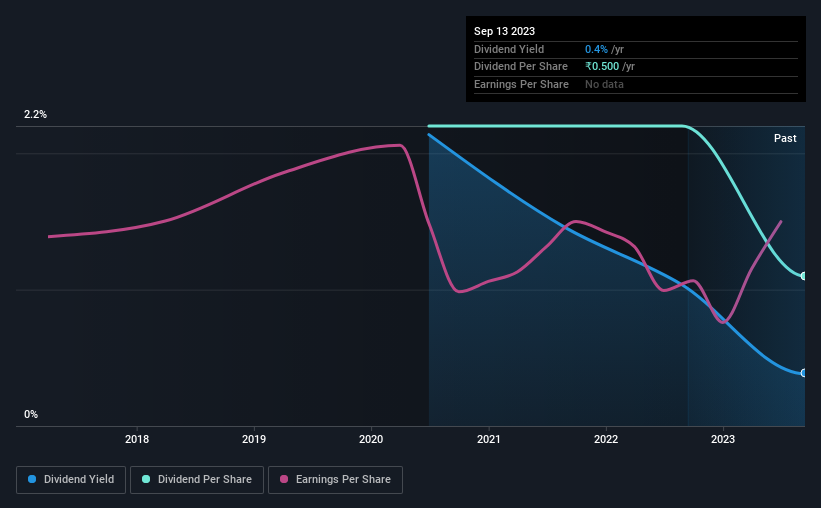Hindprakash Industries' (NSE:HPIL) Dividend Is Being Reduced To ₹0.50
Hindprakash Industries Limited (NSE:HPIL) has announced that on 30th of October, it will be paying a dividend of₹0.50, which a reduction from last year's comparable dividend. Based on this payment, the dividend yield will be 0.4%, which is lower than the average for the industry.
Check out our latest analysis for Hindprakash Industries
Hindprakash Industries' Payment Has Solid Earnings Coverage
It would be nice for the yield to be higher, but we should also check if higher levels of dividend payment would be sustainable. Before making this announcement, Hindprakash Industries was easily earning enough to cover the dividend. This means that most of what the business earns is being used to help it grow.
Over the next year, EPS could expand by 0.1% if recent trends continue. If the dividend continues on this path, the payout ratio could be 20% by next year, which we think can be pretty sustainable going forward.

Hindprakash Industries' Dividend Has Lacked Consistency
Looking back, the dividend has been unstable but with a relatively short history, we think it may be a bit early to draw conclusions about long term dividend sustainability. The annual payment during the last 3 years was ₹1.00 in 2020, and the most recent fiscal year payment was ₹0.50. This works out to a decline of approximately 50% over that time. Declining dividends isn't generally what we look for as they can indicate that the company is running into some challenges.
Hindprakash Industries May Find It Hard To Grow The Dividend
Dividends have been going in the wrong direction, so we definitely want to see a different trend in the earnings per share. Although it's important to note that Hindprakash Industries' earnings per share has basically not grown from where it was five years ago, which could erode the purchasing power of the dividend over time. Earnings growth is slow, but on the plus side, the dividend payout ratio is low and dividends could grow faster than earnings, if the company decides to increase its payout ratio.
Our Thoughts On Hindprakash Industries' Dividend
Overall, we think that Hindprakash Industries could make a reasonable income stock, even though it did cut the dividend this year. The dividend has been at reasonable levels historically, but that hasn't translated into a consistent payment. The dividend looks okay, but there have been some issues in the past, so we would be a little bit cautious.
Companies possessing a stable dividend policy will likely enjoy greater investor interest than those suffering from a more inconsistent approach. However, there are other things to consider for investors when analysing stock performance. Case in point: We've spotted 5 warning signs for Hindprakash Industries (of which 2 are a bit unpleasant!) you should know about. Looking for more high-yielding dividend ideas? Try our collection of strong dividend payers.
Valuation is complex, but we're here to simplify it.
Discover if Hindprakash Industries might be undervalued or overvalued with our detailed analysis, featuring fair value estimates, potential risks, dividends, insider trades, and its financial condition.
Access Free AnalysisHave feedback on this article? Concerned about the content? Get in touch with us directly. Alternatively, email editorial-team (at) simplywallst.com.
This article by Simply Wall St is general in nature. We provide commentary based on historical data and analyst forecasts only using an unbiased methodology and our articles are not intended to be financial advice. It does not constitute a recommendation to buy or sell any stock, and does not take account of your objectives, or your financial situation. We aim to bring you long-term focused analysis driven by fundamental data. Note that our analysis may not factor in the latest price-sensitive company announcements or qualitative material. Simply Wall St has no position in any stocks mentioned.
About NSEI:HPIL
Hindprakash Industries
Manufactures and trades in dyes, auxiliaries, intermediates, and chemicals in India and internationally.
Proven track record with low risk.
Market Insights
Community Narratives




